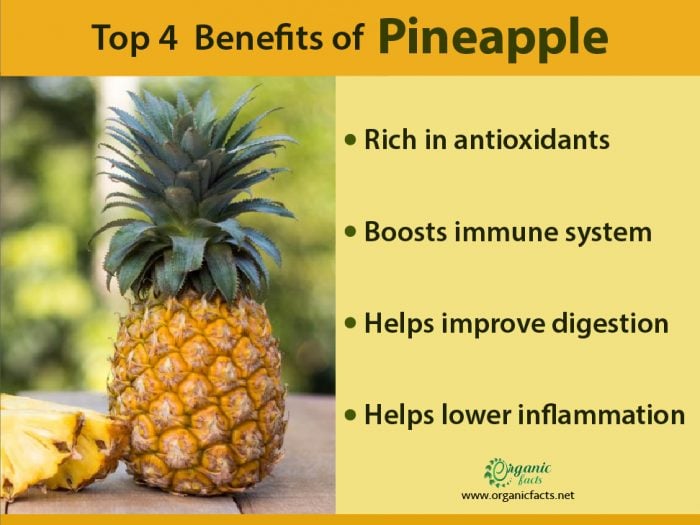Pineapple is a delicious tropical fruit, celebrated for centuries, not only for its unique taste but also for its miraculous health benefits. Eat a cup of pineapple chunks daily to reap some amazing benefits, such as boosting immunity and aiding in digestion. It is also anti-inflammatory in nature and helps in managing arthritis, osteoarthritis, and also in post-workout recovery.
What is Pineapple?
Pineapple (also known as ananas) is covered with thorny spikes and topped with hard, waxy leaves — which may total up to thirty per fruit. The fruit is up to a foot long and has a combination of sweet and tart taste. Pineapple belongs to the Bromeliaceae family and is a composite fruit made of coalesced berries that grow at the crown of a fruiting tree. [1]
The name pineapple evolved in the 17th century due to its structure and appearance being similar to pine cones. According to a study published through the Malaysian Agricultural Research and Development Institute (MARDI), pineapple is the most important tropical fruit after bananas and oranges. [2]
Serving Size : Nutrient Value Water [g] 86 Energy 50 Energy [kJ] 209 Protein [g] 0.54 Total lipid (fat) [g] 0.12 Ash [g] 0.22 Carbohydrate, by difference [g] 13.12 Fiber, total dietary [g] 1.4 Sugars, total including NLEA [g] 9.85 Sucrose [g] 5.99 Glucose (dextrose) [g] 1.73 Fructose [g] 2.12 Calcium, Ca [mg] 13 Iron, Fe [mg] 0.29 Magnesium, Mg [mg] 12 Phosphorus, P [mg] 8 Potassium, K [mg] 109 Sodium, Na [mg] 1 Zinc, Zn [mg] 0.12 Copper, Cu [mg] 0.11 Manganese, Mn [mg] 0.93 Selenium, Se [µg] 0.1 Vitamin C, total ascorbic acid [mg] 47.8 Thiamin [mg] 0.08 Riboflavin [mg] 0.03 Niacin [mg] 0.5 Pantothenic acid [mg] 0.21 Vitamin B-6 [mg] 0.11 Folate, total [µg] 18 Folate, food [µg] 18 Folate, DFE [µg] 18 Choline, total [mg] 5.5 Betaine [mg] 0.1 Vitamin A, RAE [µg] 3 Carotene, beta [µg] 35 Vitamin A, IU [IU] 58 Vitamin E (alpha-tocopherol) [mg] 0.02 Tocotrienol, alpha [mg] 0.02 Vitamin K (phylloquinone) [µg] 0.7 Fatty acids, total saturated [g] 0.01 16:0 [g] 0.01 18:0 [g] 0 Fatty acids, total monounsaturated [g] 0.01 16:1 [g] 0 18:1 [g] 0.01 Fatty acids, total polyunsaturated [g] 0.04 18:2 [g] 0.02 18:3 [g] 0.02 Phytosterols [mg] 6 Tryptophan [g] 0.01 Threonine [g] 0.02 Isoleucine [g] 0.02 Leucine [g] 0.02 Lysine [g] 0.03 Methionine [g] 0.01 Cystine [g] 0.01 Phenylalanine [g] 0.02 Tyrosine [g] 0.02 Valine [g] 0.02 Arginine [g] 0.02 Histidine [g] 0.01 Alanine [g] 0.03 Aspartic acid [g] 0.12 Glutamic acid [g] 0.08 Glycine [g] 0.02 Proline [g] 0.02 Serine [g] 0.04 Sources include : USDA [3]
Pineapple Nutrition
Pineapple is chock full of several health benefits due to its nutrient content. It contains bromelain, protein, carbohydrates, sugar, and soluble and insoluble dietary fiber, as per NISCAIR Online Periodicals Laboratory. The vitamins in these fruits include vitamin A, vitamin C, beta-carotene, thiamin, vitamin B5 (pantothenic acid), vitamin B6, and folate, as per the USDA. [4] [5]
Minerals like potassium, copper, manganese, calcium, sodium, and magnesium are also found in pineapples. These tropical fruits are low in calories and high in water content, which means they can be a part of a weight-loss diet when consumed in moderation.

Pineapples have a number of amazing benefits due to their antioxidant nature. Photo Credit: Shutterstock
Health Benefits of Pineapple
The pineapple fruit is known to offer several benefits. Let us discuss each benefit in detail below.
A Treasure Trove of Antioxidants
Pineapples are a delightful blend of taste and health benefits, thanks to their rich nutrient and antioxidant profile. These antioxidants are crucial in combating oxidative stress within our bodies.
A 2014 study published in the journal Molecules highlighted that pineapples are a robust source of flavonoids, which are instrumental in battling oxidative stress. Moreover, a 2011 research featured in Food Research International emphasized the antioxidant prowess of pineapples, attributed to their phenolic content, making them a promising source of antioxidants. [6] [7] [8]
Although human studies are sparse, an intriguing rat study hinted at the heart-protective potential of pineapple’s antioxidants. So, incorporating this tropical fruit into your diet could be a step towards a hearty and antioxidant-rich dietary regime. [9]
A Boost to Immunity
Pineapples, laden with vitamin C or ascorbic acid, are reputed for potentially reducing illnesses and suppressing inflammation, while also giving the immune system a boost through white blood cell activation. This tropical fruit has found its place in traditional medicine for centuries. [10] [11] [12]
A notable nine-week study conducted in the Philippines delved into the impact of pineapple on immunity levels among nearly 100 children. They were divided into three groups: no fruit, some fruit, and a generous serving of fruit daily. The findings were compelling; children indulging in this fruit exhibited a reduced risk of viral infections and boasted almost four times more white blood cells compared to their counterparts, hinting at a positive correlation between pineapple intake and enhanced immunity. [13]
While these findings are promising, further research is warranted to cement these associations.
Aids in Digestion
Indulging in fresh pineapple regularly can be a shield against various digestive ailments like constipation, diarrhea, and irritable bowel syndrome (IBS), as per a review by naturopathic doctor Roxas Mario. The fruit houses a cluster of digestive enzymes known as bromelain, which notably eases meat digestion by breaking down protein molecules for smoother absorption in the small intestine. [14] [15] [16]
Interestingly, bromelain’s protein-dissolving prowess also lends itself to commercial meat tenderizing. A particular test-tube study observed a reduction in inflammatory markers within digestive tissue courtesy of bromelain, although more research is essential to solidify these findings. [17] [18]
Besides, pineapples are a commendable source of dietary fiber, adding another feather to its cap for promoting digestive ease. [19]
Hence, a slice of pineapple could be your digestive tract’s friend, making mealtime a more pleasant experience.

Pineapple is covered with thorny spikes and topped with hard, waxy leaves.
Reduces Inflammation & Manages Arthritis Pain
Pineapple, with its high vitamin C content, plays a role in hastening the healing of wounds and injuries. It’s particularly known for alleviating inflammation in joints and muscles, often associated with arthritis, thanks to a unique proteolytic enzyme called bromelain. Bromelain aids in breaking down complex proteins and exhibits anti-inflammatory properties. [20]
A review by Sarah Brien from the University of Southampton, UK, hinted at bromelain’s potential in mitigating the risk of osteoarthritis, although more research is needed. While bromelain supplements and pineapple enzymes are accessible over the counter, it’s advisable to use them under medical guidance. [21]
In a study focusing on individuals with osteoarthritis, a supplement containing bromelain, naturally present in pineapples, demonstrated effectiveness in alleviating pain, comparable to common arthritis medications. Further, a 2016 research highlighted pineapple’s anti-inflammatory, antithrombotic, and fibrinolytic effects, showcasing its efficiency in managing both internal and external injuries. [22] [23]
Hence, pineapple could be a natural ally in managing inflammation and arthritis discomfort.
Accelerating Recovery Post Surgery or Rigorous Exercise
Research from the University of Tasmania in Australia suggests that bromelain, a key enzyme in pineapple, has a positive impact on exercise-induced injuries or muscle damage. In Europe, bromelain has been employed to expedite the healing of surgical wounds, inflammation from trauma, and treatment of deep burns, as highlighted in a study in the Journal of the Pakistan Medical Association. [24] [25]
Moreover, bromelain may alleviate discomfort, pain, or swelling following dental surgery. While these findings are promising, further research is essential to substantiate these benefits. Incorporating pineapple or bromelain supplements, under medical supervision, could potentially hasten recovery after strenuous activities or surgical procedures. [26]
How to tell when a pineapple is ripe?
The ripeness and freshness of pineapple can be determined by the smell of its base (no matter how green the crown is). Choose pineapples that have a base that smells sweet, just like its juice. A fragrance-free pineapple is either harvested too early or is not as sweet as it should be.
Note: If you are planning to consume this fruit, cut the crown and keep the fruit in the fridge, placing it upside down. Generally, the sweetness settles at the bottom of the fruit, and this will help in distributing it throughout the pineapple. It’s best to have the slices when it’s fresh so as to get maximum nutrition from it.
Different Ways of Using Pineapple
The fruit can be added to your daily diet in many forms, most commonly by cutting them into chunks to snack on!
- Crushed pineapple can also be added to cupcakes, cookies, bars, ice creams, yogurt, and various other desserts.
- Fresh pineapple juice or smoothie is another popular and delicious way to start your day. Read the full benefits of pineapple juice here – 14 Amazing Health Benefits Of Pineapple Juice and if you’re looking to make the smoothie, then head on here – How To Make Pineapple Green Smoothie
- The pineapple upside-down cake is an all-time favorite of food enthusiasts around the world – find the full recipe here – Spiced Pineapple Upside-Down Cake Recipe.
- Many people also prefer to drink the tea of this fruit. You can read our detailed article on it – Pineapple Tea: How To Make & Benefits.
- Antioxidant-rich pineapple juice is also enjoyed around the world in the form of the most famous tropical drink Pina Colada.
- Pineapple leaves are used as wallpaper and in ceiling insulation.
- Pineapple fragrance oils are also popular due to their tropical touch.
- Do you know that pineapples can also be consumed by dogs – detailed article here – Can Dogs Eat Pineapple?
Possible Risks of Consuming Pineapple
- Pineapple allergy: Because of bromelain, your lips, gums, and tongue may experience some tenderness or sensitivity if you eat too much. This is also known as pineapple allergy. [27]
- Canned pineapples: Preservatives like sugar in canned pineapples are harmful to all, but especially to those with diabetes and those wanting to achieve weight loss goals.
- Pregnancy: Bromelain has been known to stimulate menstruation, so pregnant women should avoid excessive intake of this fruit in order to prevent an increased chance of a miscarriage. [28]
- Interaction with medications: Individuals on medications like anticoagulants, blood thinners, insomnia drugs, antidepressants, and benzodiazepines may be advised to limit or avoid pineapple products, as they may interfere with these medications. [29]
- Heart disorders: People on medication beta-blockers should consume pineapple in moderation as it can add to the potassium levels in the blood and cause them to rise.
- Kidney diseases: Pineapple contains potassium, which is healthy, however, it can lead to negative effects if the intake of the fruit is not limited to certain kidney diseases. Always consult with a physician if you are being treated for one of these ailments.
- Gastroesophageal reflux diseases (GERD): People suffering from GERD may witness an increase in serious symptoms like heartburn and regurgitation if too much of it is eaten.
- Pesticides: Often used to kill fungi and harmful organisms, pesticides can also affect your health if you purchase pineapples from an unreliable source.
Final Thoughts
In conclusion, the pineapple, adorned with a blend of sweet and tart, is not merely a tropical delight but a reservoir of health benefits. Its rich concoction of nutrients, notably bromelain, unfurls a realm of wellness, aiding in immunity boost, digestion, and managing inflammation, a boon particularly for arthritis sufferers. Its versatility in culinary realms makes it a delightful and easy addition to our daily nourishment. However, a balanced indulgence is key to evading potential adversities, especially for individuals with certain medical conditions or on specific medications. As we relish the tropical zest of pineapples, we’re not just satiating our taste buds, but stepping towards a bouquet of health benefits, making each slice a journey towards well-being.
